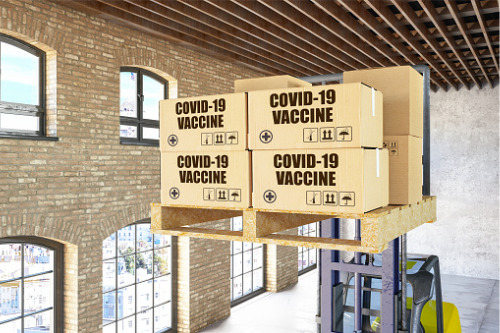

The international COVID-19 vaccination race is well and truly underway – but Canada’s national campaign is off to a sluggish start. Since COVID-19 vaccination began in Canada in the week of December 13, 2020, the country has only fully vaccinated 1.46% of the population – a marked difference to the United States, where they’re fast approaching 10% of the total population being fully vaccinated.
By and large, Canada’s delays are down to manufacturing power. With no domestic production facilities for the approved vaccines – currently supplied by Moderna, Pfizer-BioNTech, and AstraZeneca, with others (including Johnson and Johnson) under close review – Canada has had to rely on other countries to produce and ship the vaccine over. But, delays in complex production schedules have hampered Canada’s early immunization goals.
The transportation of COVID-19 vaccines was a key topic of discussion at the recent Allianz Risk Barometer 2021 North America overview. From a marine transportation standpoint, underwriters harbour multiple concerns around the rollout of COVID-19 vaccines and the speed of delivery, according to Brian McClintock, Cargo Product Director - Northeast & South Zones, at Allianz Global Corporate & Specialty (AGCS).
The first issue is the lack of storage stability data as it relates to the different vaccines’ temperature sensitivity. The Moderna, Pfizer-BioNTech, and AstraZeneca vaccines all have different storage requirements in terms of temperature. The Pfizer-BioNTech vaccine, for example, must be kept at -70C, while Moderna has said its vaccine can be kept at -20C.
“We have limited data right now as to what the temperature excursions are on [the various] vaccines,” said McClintock. “At this point, we need to figure out: if there is some sort of temperature excursion outside the normal deviation, is that considered a total loss? That is something everybody is grappling with.”
There’s been a lot of talk worldwide about the ultra-cold storage requirements of the Pfizer-BioNTech vaccine – the first COVID-19 vaccine to be approved in Canada- and whether manufacturers and cargo carriers are equipped to deal with the -70C requirement. While McClintock said this is a concern in the marine underwriting community, he added that it’s not as great of an issue as some have made it out to be.
“As more and more vaccines come online, we might see less dedicated [cargo] carriers getting more involved with transporting the vaccine,” the cargo expert pointed out. “That could be a problem if they’re not properly trained, or they don’t have the proper trucks or aircraft to move the pharmaceutical product – the vaccines – in a temperature sensitive way. That is something we worry about.”
Marine cargo underwriters are also concerned about potential build-ups of product and value. McClintock commented: “Right now, vaccines are being manufactured and they’re being shipped out very quickly, so there’s minimal storage time due to the demand. But longer-term, there are some concerns about the potential build-up of vaccines in static locations.”
The build-up of value could increase exposure to theft – another key concern that McClintock raised, alongside potential hijackings and the distribution of counterfeit vaccine products, especially in underdeveloped countries.
He added: “As COVID-19 vaccines get rolled out more across the globe into those underdeveloped countries, issues like [theft, hijackings and counterfeit products] become a little bit more of a concern.”
